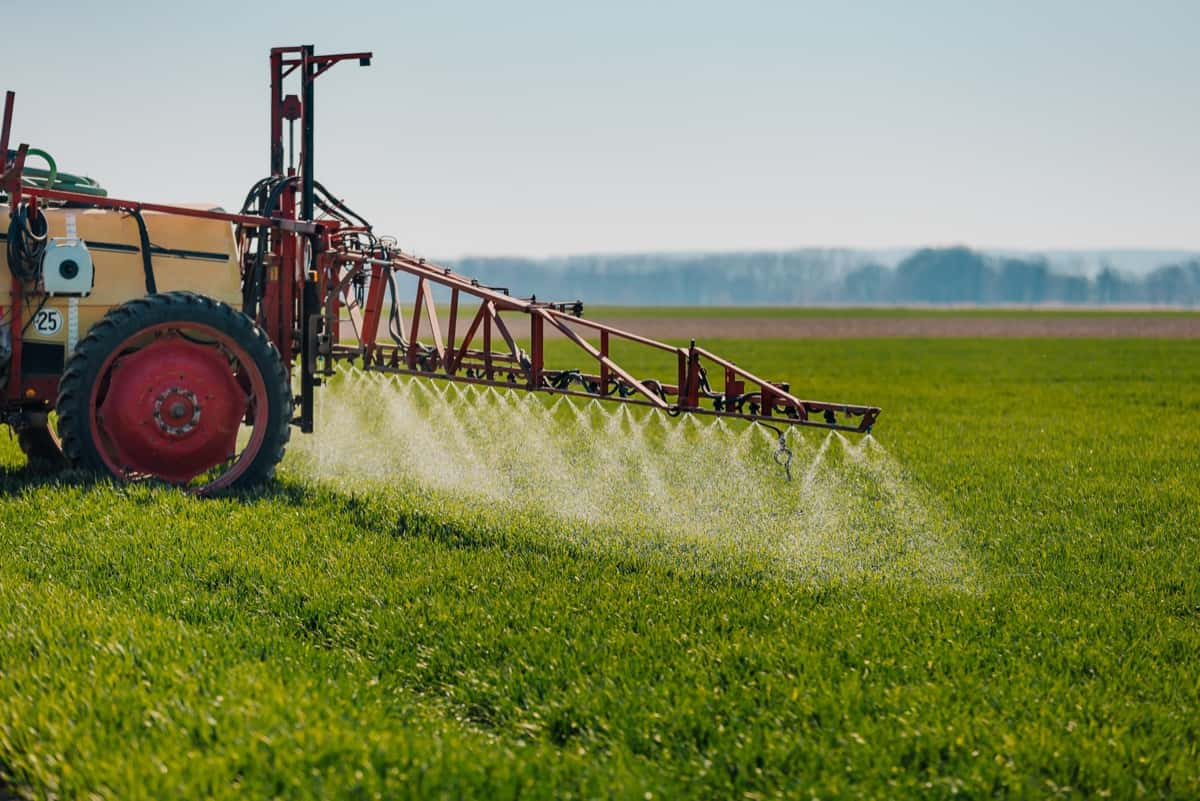Nano Copper, a form of copper broken down into extremely small particles, has the potential to revolutionize agriculture and plant health. Measured in nanometers, Nano Copper is one of the smallest forms of copper available, with a very large surface area that makes it highly reactive. It can improve plant metabolism, promote growth, and prevent diseases and pests from damaging crops. This blog will discuss the top 10 benefits of using Nano Copper in agriculture, including increased crop yield, improved nutrient uptake, and enhanced resistance to stress factors.

The Power of Nano Copper
What is Nano Copper?
Nano Copper refers to copper broken down into extremely small particles, measured in nanometers. This makes it one of the smallest forms of copper available, with a very large surface area, which makes it highly reactive. Copper nanoparticles can be naturally occurring or synthesized chemically, and they have been historically used as coloring agents in biomedicine and antimicrobial applications. One of the main uses of Nano Copper is in agriculture, where it can improve plant health and increase crop yield. It can be applied directly to plants or added to irrigation water, and once absorbed by the plant, it improves metabolism and promotes growth. Additionally, Nano Copper effectively prevents diseases and pests from harming crops.
Making of Nano Copper
- Copper nanoparticles are preferred over silver nanoparticles due to their low cost and widespread availability.
- Green synthesis of copper nanoparticles from plant extracts is a novel and eco-friendly approach for plant disease protection.
- The process involves collecting fresh leaves, washing, drying, grinding, boiling in distilled water, filtering, and then introducing the extract to a copper sulfate solution for incubation.
- The resulting solution contains copper nanoparticles that can be used as foliar sprays at different concentrations.
- Various methods exist for synthesizing copper nanoparticles, including chemical reduction using copper hydrazine carboxylate or copper chloride in aqueous solutions and reduction using L-ascorbic acid.
- Varying reaction conditions, such as temperature and reagents, can control the shape and size of copper nanoparticles.
How Does Nano Copper Benefit Plants?
- Improves growth and yield: Nano Copper stimulates cell division and elongation, increases chlorophyll production, and improves water use efficiency, leading to increased growth and yield.
- Increases disease resistance: Nano Copper increases the production of antioxidants and phytoalexins in plants, helping them to resist better diseases caused by bacteria, fungi, and viruses.
- Enhances nutrient uptake: Nano Copper stimulates root growth and increases the surface area of roots, improving the uptake of nutrients by plants.
- Protects against environmental stressors: Nano Copper can help plants to withstand environmental stressors such as drought, heat, and cold, keeping them healthy in a changing climate.
- Flowering plants, which play a vital role in the ecosystem, are threatened by environmental stressors such as climate change, water shortages, and soil degradation.
In case you missed it: Advantages of Nano Silver in Agriculture: How and When to Apply to Your Plants

10 Benefits of Nano Copper in Improving Agriculture
Nano Copper is a powerful tool that can greatly benefit agriculture. It is a type of copper that has been reduced to nanoparticle form and can be used in various ways to improve plant growth and health.
- Increased nutrient uptake: Nano Copper can stimulate root growth and increase the surface area of roots, leading to improved nutrient uptake by plants.
- Enhanced plant growth and yield: Nano Copper can stimulate cell division and elongation, increase chlorophyll production, and improve water use efficiency, improving plant growth and yield.
- Increased disease resistance: Nano Copper can increase the production of antioxidants and phytoalexins, which help plants to resist better diseases caused by bacteria, fungi, and viruses.
- Improved soil health: Nano Copper can improve the microbial activity in the soil, leading to improved soil health and nutrient cycling.
- Reduced fertilizer use: Nano Copper can help reduce the need for synthetic fertilizers by improving nutrient uptake and soil health.
- Improved seed germination: Nano Copper can enhance seed germination by promoting the growth of healthy seedlings.
- Reduced water usage: Nano Copper can improve plant water use efficiency, reducing the amount of water needed for irrigation.
- Improved crop quality: Nano Copper can improve the quality of crops by increasing nutrient content, improving flavor, and reducing spoilage.
- Reduced pesticide use: Nano Copper can be used as a natural pesticide, reducing the need for synthetic chemicals that can harm the environment.
- Environmental benefits: Using Nano Copper in agriculture can have environmental benefits, such as reducing greenhouse gas need for synthetic fertilizers and pesticides.
Management of Disease by Nano Copper
- Inhibits bacterial growth: Nano Copper can inhibit the growth of Xanthomonas axonopodis pv. punicae, a bacterium that causes bacterial blight in pomegranate. It is effective at a much lower concentration than traditional copper-based pesticides.
- Synergistic effect: When combined with complex chitosan nano-gels, Nano Copper can inhibit the growth of cereal plant pathogenic fungus Fusarium graminearum. This is due to their synergistic effect.
- Bio-compatibility: Nano Copper-based bio-pesticides such as nano-hydrogels are bio-compatible and can be considered a new generation of Cu-based bio-pesticides.
- Inhibits fungal development: Biogenically synthesized Cu NPs have been found to inhibit the development of fungi such as F. oxysporum, Fusarium culmorum, and F. graminearum.
- Market availability: Nano-based products such as nano-pesticides, nano-fungicides, and nano-insecticides are already available, while many others are developing.
Using Nano Copper in Horticulture Crops
Herbal Crops
- Nano Copper can be used as a spray or powder to coat the leaves of plants and has been shown to increase essential oil production and improve the quality of herbs.
- This material can help improve plant growth and yield.
Vegetable Crops
- Nano Copper has been shown to improve the yield and quality of vegetable crops.
- It can help increase the uptake of essential nutrients, improve water use efficiency, and reduce the spread of diseases.
- Nano Copper also has the potential to increase the shelf life of vegetables.
Fruit Crops
- Nano Copper can improve plant growth, yield, and quality in fruit crops.
- It can help control pests and diseases in these crops.
- Nano Copper is effective against various plant pathogens and can be applied through irrigation systems.
- It is most effective when used preventatively before pathogen infection.
- Nano Copper has a relatively long shelf-life and can be stored for future use.
- It is non-toxic to plants and animals, making it safe for use around the home and garden.
In case you missed it: How to Use Green Chilli Garlic Mix as Organic Pesticide for Your Garden Plants

Conclusion
Using nano copper in agriculture and plant health offers numerous benefits, including improved growth and yield, disease and pest control, increased nutrient uptake, and environmental sustainability. As a promising alternative to traditional pesticides and herbicides, nano copper has the potential to revolutionize the way we grow food and improve the overall health of our crops.
- Feed Your Flock for Less: Top 10 Tips to Save on Chicken Feed
- Ultimate Guide to Ossabaw Island Hog: Breeding, Raising, Diet, and Care
- Hatching Answers: The Top 10 Reasons Your Chickens Aren’t Laying Eggs
- Eggs and Economics: Breaking Down the Cost of Raising Backyard Chickens
- Defend Your Greens: Proven Methods to Keep Iguanas Out of Your Garden
- Ultimate Guide to Cinnamon Queen Chicken: A Comprehensive Guide for Beginners
- Ultimate Guide to California Tan Chicken: Breeding, Raising, Diet, Egg-Production and Care
- Ultimate Guide to Marsh Daisy Chicken: Breeding, Raising, Diet, and Care
- 10 Types of Chicken Farming Businesses You Can Start for Profits